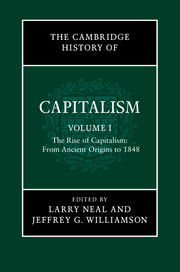Book contents
- The Cambridge History of Capitalism
- Reviews
- The Cambridge History of Capitalism
- Copyright page
- Contents
- Figures
- Maps
- Tables
- Contributors
- 1 Introduction
- 2 Babylonia in the first millenniumbce– economic growth in times of empire
- 3 Capitalism and the ancient Greek economy
- 4 Re-constructing the Roman economy
- 5 Trans-Asian trade, or the Silk Road deconstructed (antiquity, middle ages)
- 6 China before capitalism
- 7 Capitalism in India in the very long run
- 8 Institutional change and economic development in the Middle East, 700–1800
- 9 Markets and coercion in medieval Europe
- 10 Thevia italianato capitalism
- 11 The Low Countries
- 12 The formation of states and transitions to modern economies:
- 13 Capitalism and dependency in Latin America
- 14 The emergence of African capitalism
- 15 Native Americans and exchange:
- 16 British and European industrialization
- 17 America:
- 18 The political economy of rising capitalism
- Index
8 - Institutional change and economic development in the Middle East, 700–1800
Published online by Cambridge University Press: 05 March 2014
- The Cambridge History of Capitalism
- Reviews
- The Cambridge History of Capitalism
- Copyright page
- Contents
- Figures
- Maps
- Tables
- Contributors
- 1 Introduction
- 2 Babylonia in the first millenniumbce– economic growth in times of empire
- 3 Capitalism and the ancient Greek economy
- 4 Re-constructing the Roman economy
- 5 Trans-Asian trade, or the Silk Road deconstructed (antiquity, middle ages)
- 6 China before capitalism
- 7 Capitalism in India in the very long run
- 8 Institutional change and economic development in the Middle East, 700–1800
- 9 Markets and coercion in medieval Europe
- 10 Thevia italianato capitalism
- 11 The Low Countries
- 12 The formation of states and transitions to modern economies:
- 13 Capitalism and dependency in Latin America
- 14 The emergence of African capitalism
- 15 Native Americans and exchange:
- 16 British and European industrialization
- 17 America:
- 18 The political economy of rising capitalism
- Index
Summary
- Type
- Chapter
- Information
- The Cambridge History of Capitalism , pp. 193 - 224Publisher: Cambridge University PressPrint publication year: 2014
- 2
- Cited by



